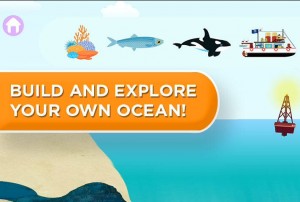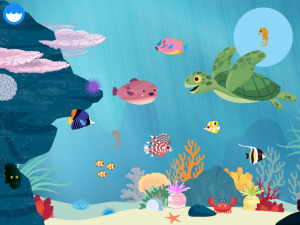
MarcoPolo Ocean has sold for about $2.99 in the App Store.
“Tell me and I forget, teach me and I may remember, involve me and I learn.”
Whether they are the words of Ben Franklin or an ancient Chinese philosopher, Justin Hsu knew they were going to be a motto of sorts for his independent educational game shop.
The Mother (and Fathers) of Invention
Hsu and Nazar Yasin may seem like an unlikely learning game operation. Hsu spent years in the entertainment and music business and Yasin in the venture capital world, but then something happened.
“We had kids,” Hsu said recently, “and we’re entrepreneurial and we looked at what was out there and we were disappointed by the kids content.”
Hsu said many of the learning apps were either platforms for existing brands to push their characters and products or were the equivalent of digital flashcards.
As parents we didn’t want to just put Disney or Nickelodeon on the iPad like it is on the TV. Those apps are almost always very much about the characters from the movies and shows… We wanted the learning goals to be what came first.
Justin Hsu, MarcoPolo Learning
It was how MarcoPolo Learning was born. The company, launched in 2012, landed $1 million in seed funding from angel investors in May of last year, according to TechCrunch.
The company is the latest in a growing number of independent game developers born out of a generation of gamers and entertainment folks who are now seeking educational content for their children and finding a new business in the effort.
The learning games industry has been fundamentally changed, said scholar James Paul Gee, by the economics of downloadable games and apps. He recently credited the new economics for making it so that “independent game people could really make a living. We began to get whole new types of games… You began to see people playing with new game mechanics, new content, new ways of interacting with the player. You saw much more creativity.”
MarcoPolo Ocean is the first product from the company and has managed to garner the attention of the App Store and, via their selection, thousands of users.
Hsu said the company wanted its initial product to make a splash and so they considered the market and the core ideas first.
“We spent a lot of time with the research, trying to find research into traditional children’s media and other developments,” he said. “We found it was really a crowded market for the ABC’s and 123’s… and few of them tapped the power of the touch device.”
The Development Process
They decided they would focus on the ideas of exploration and so-called “maker” games.
“By building something, it is a better way to teach a child,” Hsu said. “ We decided on Marco Polo because we wanted the games to help kids explore.”
With the concept of exploration locked in, the team assessed the market and found few apps about the ocean for young children.
Then came the team.
Hsu and Yasin sought developers and designers in Europe, finding a strong base of creative talent in Germany.
They then considered the game mechanic that would underlie the app, settling on the idea of a puzzle as the core game.
Back in the U.S., they found a group of experts in marine science, child development and design to inform the project.

“Our first design had cuter fish with bigger eyes and more cartoonish features…”
“Having the educators involved from day one changed many aspects of what we built,” Hsu said. “Our first design had cuter fish with bigger eyes and more cartoonish features and our team said you need to make them more realistic.”
Then came the testing.
“We went through rounds and rounds of professional testing,” Hsu said, adding the groups ranged from 20-child group testing to a handful testing a specific element of the game.
The goal was simple: hook the kids.
“It had to be fun,” Hsu said. “We kept testing to make sure that engagement was high.”
The resulting game drew some initial interest from parents who raved about the animation and effects it had on their children.
One review still up in the App Store captures the sense the team got from the early users. The five star review reads, “This app combines entertainment and education in an immersive way. It takes kids on an under sea adventure. They are encouraged to build, navigate and add stuff to the world in a magical way it keeps them wanting to explore more and more… A great app that uses creative play to teach young kids about the ocean. This app is edutainment at its best!”
And online video reviews also heaped positive reviews on the new app.
But it wasn’t just parents.
“We got some indication that Apple was looking at the product,” Hsu said, and then the App Store made it a featured app and Ocean was on its rocket ride.
Hsu said the entire selection by Apple was “an opaque process,” but credits the way his team focused on taking full advantage of the iPad to create an educational app that is both engaging and “wholesome.”
The team is already working on a second app that builds on the lessons from MarcoPolo’s first adventure and it is expected later this spring.
But for now, Hsu is welcoming other independents into the field with some advice his startup has already learned.
“Work with educators from the beginning to make sure you never lose focus of the point of the game,” he said. “Do a lot of testing to make sure it is the game you want it to be and quality of the design and development is what stands out.”
